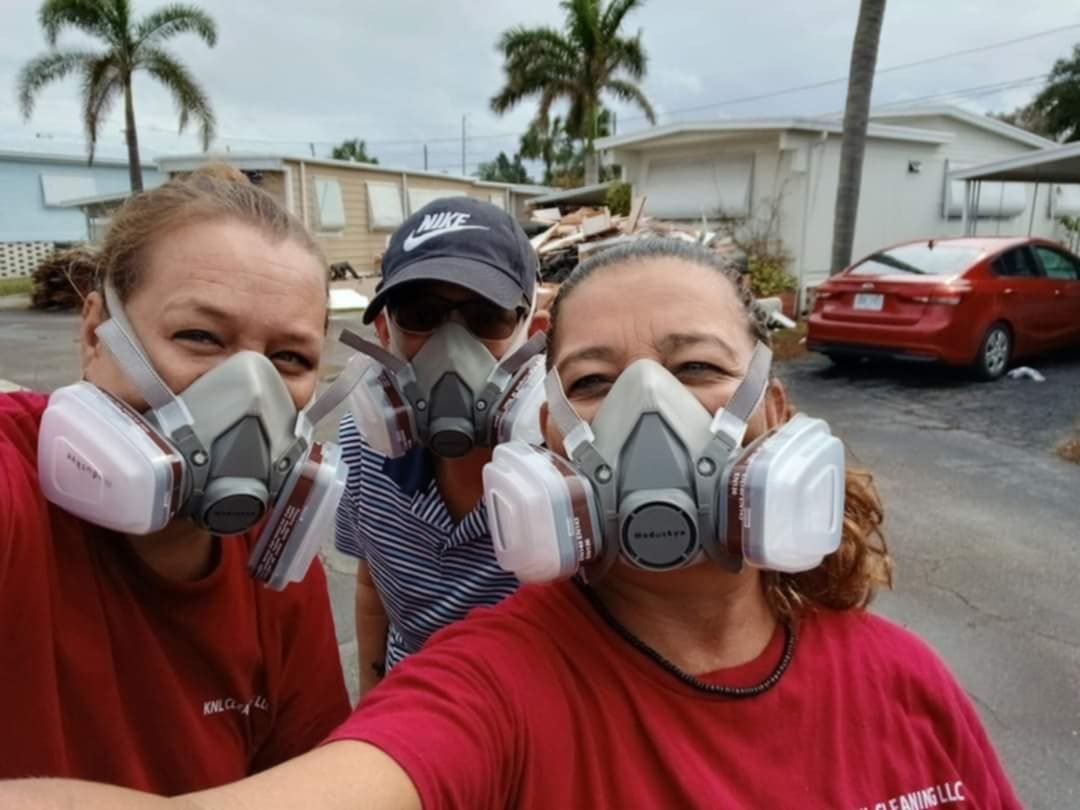
Dykes and disasters
How the Tampa Bay Area’s lesbian community showed up for each other in the wake of two devastating hurricanes
St. Petersburg resident Karen Santos was helping neighbors clean up from Hurricane Helene when she heard that a second hurricane would be hitting the city. A stranger posted on Facebook saying she was out of town and needed someone to prepare her home for oncoming Hurricane Milton, so Karen spent three hours waiting in line for sandbags. When Milton rendered Karen’s own home uninhabitable, she and her wife, Crystal, found themselves on the receiving end of the same generosity they had expressed.
People rallied around them, offering support with cleaning, packing, shelter, and meals. One friend dropped off 100 boxes, while another is coordinating a storage unit for their salvageable belongings. “We come from an amazing community,” Crystal says. “If you’re part of it, then I’m sure you are blessed with people that are there for you. We’ve received a lot of blessings.” Karen and Crystal say that learning to accept help in the wake of Milton has been a challenging and humbling experience. The couple are involved with a group of sisters who aim to make sure nobody slips through the cracks as Tampa Bay rebuilds.
Anna Leverenz, founder of Alt Womyn Events, organized a group she calls her “Alt Womyn Warrior Angels in Boots.” Leverenz saw people posting on Facebook getting help, but recognized that there were many people who didn’t use social media and didn’t know where to turn for assistance. “I started reading about the forgotten elderly. So we started going around to mobile home parks seeking out sisters, and women in general,” Leverenz says. “Ten days later, they were sitting inside their homes with no electricity, soaked furniture, so we started helping them out from there. They’re sitting there in shock, not knowing what happened, and nobody’s checked on them.” The group of rugged “DIYers” put their handiness and power tools to good use while hauling out wet furniture, taking down moldy drywall, and pulling up rotten flooring, as well as distributing food to the communities they helped.
Further door-knocking efforts were orchestrated by Claire Elisan, founder and CEO of Project No Labels, a volunteer-run organization that aims to empower and strengthen the Tampa Bay LGBTQ+ community. “We [are] not a disaster relief organization by any means, but because we have the capability and the bandwidth… it only made sense that we got involved.” In collaboration with Mutual Aid Disaster Relief, Balance Tampa Bay, Tampa Bay Lesbians, and Poetry is Activism, Elisan started an event called “Boots On The Ground,” an effort by the LGBTQ+ community in the bay to go door-to-door to see who needs supplies and other support. “Project No Labels is knocking on doors asking people what they need,” Elisan says, “whether that’s water, food, gas for your generator, dog food, cat food, whatever the case may be. It was just a matter of getting the supplies to people who need it without them having to go somewhere to ask for it.”
In other parts of the city, disaster came after the storm. Several days after Milton blew through town, power was restored to Taro Cole’s home in St. Petersburg while they were at work. This caused an electrical fire to break out, rendering the home and most of Cole’s belongings unsalvageable. It was in the aftermath of this disaster that Cole felt the community’s support. “Six of our friends showed up immediately before the fire department had even left the scene,” Cole says, “and within 24 hours, all of our immediate needs had been met.” Cole’s found family provided comfort, bought new clothes and toiletries, and provided food and shelter. Others offered laundry services, haircuts, and grounding spiritual reassurance. Days later, Cole put out a call on social media to have a cleanup day, where they removed everything from the home. Cole recounts, “30 to 40 people came. We had my house completely emptied within three hours. The people that showed up were people from my job, people that I have never met, people that I haven’t seen in years, people that I didn’t even know still liked me.”
As recovery efforts continue, Leverenz emphasizes the value of the connections that were built in the aftermath. “The women that have stepped up have literally become my sisters,” she says. “I knew them, I know of them, but the efforts that they’ve put into their community and beyond have touched my heart. … I want [them] in my life forever.” Crystal echoes the appreciation for her support network, saying, “This isn’t just support that we’ve felt because of the storm; this is the true sense of community that we have and have had for a long time.”
This article was originally published in the November 2024 issue of The Sapphic Sun


